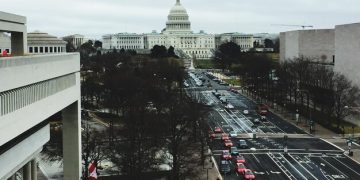New Disclosure Requirements for Political Figures’ Finances in 2025

In 2025, new disclosure requirements for political figures’ financial holdings aim to increase transparency and accountability, impacting what assets must be reported and how often, potentially influencing public trust and political behavior.
The landscape of political transparency is set to evolve significantly with the introduction of new regulations. Understanding what are the new disclosure requirements for political figures’ financial holdings in 2025 is crucial for both those in office and the public they serve.
Understanding the Rationale Behind Increased Financial Disclosure
The push for increased financial disclosure stems from a desire to ensure that political figures are acting in the public’s best interest. Public trust is built on the perception of integrity and the absence of conflicts of interest. Financial disclosures provide a mechanism for the public to evaluate whether a politician’s personal financial interests might be influencing their decisions in office.
These requirements aren’t just about identifying potential corruption; they also aim to deter unethical behavior proactively. By shining a light on financial holdings, the regulations make it more difficult for politicians to engage in self-dealing or to make decisions that disproportionately benefit their own portfolios.
Historical Context of Financial Disclosure Laws
Financial disclosure laws are not new. They have evolved over decades in response to various scandals and a growing awareness of the need for transparency in government. Early laws often had loopholes and limited scope, making them less effective.
The Sarbanes-Oxley Act of 2002, while primarily focused on corporate governance, set a precedent for stricter financial reporting standards. This act influenced subsequent legislation aimed at political figures, leading to more comprehensive and detailed disclosure requirements.
- Early Regulations: Focused primarily on income and major assets.
- Post-Sarbanes-Oxley: Emphasis on detailed reporting of all financial holdings.
- 2025 Requirements: Expansion to include digital assets and indirect holdings.
In conclusion, the increased financial disclosure requirements reflect a long-term trend towards greater transparency and accountability in government. These measures are intended to safeguard public trust and ensure that political decisions are made in the best interests of the citizens.

Key Changes to Financial Disclosure Requirements in 2025
The 2025 regulations introduce several significant changes to what, when, and how political figures must disclose their financial holdings. These changes are designed to address loopholes in previous laws and to adapt to the evolving financial landscape.
One of the most significant shifts is the expanded definition of “financial holdings.” The new rules clarify that not only direct investments such as stocks and bonds must be disclosed, but also indirect holdings through trusts, partnerships, and other entities.
Expanded Definition of “Financial Holdings”
Previously, politicians could shield some of their assets by placing them in trusts or other investment vehicles. The 2025 regulations aim to close this loophole by requiring disclosure of any entity where the politician or their immediate family has a controlling interest or significant beneficial ownership.
This expanded definition also encompasses digital assets, such as cryptocurrencies and non-fungible tokens (NFTs). The growing prevalence of these assets in the financial system has made it necessary to include them in disclosure requirements to ensure transparency.
- Direct Investments: Stocks, bonds, and other publicly traded securities.
- Indirect Holdings: Assets held through trusts, partnerships, and other entities.
- Digital Assets: Cryptocurrencies, NFTs, and other digital investments.
In conclusion, the key changes to financial disclosure requirements in 2025 reflect an effort to create a more comprehensive and transparent system. By expanding the definition of “financial holdings” and mandating more frequent reporting, the regulations aim to enhance accountability and deter potential conflicts of interest.
Impact on Political Figures and Their Compliance
The new disclosure requirements will undoubtedly have a significant impact on political figures and their day-to-day practices. Increased scrutiny and the need for more detailed reporting will require politicians to be more diligent in managing their finances and ensuring compliance with the regulations.
For some political figures, the new requirements may necessitate divesting certain assets or restructuring their financial affairs to avoid potential conflicts of interest. Compliance will also require a deeper understanding of the rules and the engagement of financial professionals to ensure accurate and timely reporting.
Challenges in Meeting the New Requirements
One of the primary challenges will be the increased complexity of the reporting process. Political figures will need to gather and organize a significant amount of financial information, including details about their direct and indirect holdings.
Another challenge is the potential for inadvertent errors or omissions in the disclosures. Given the volume of information required, it will be essential for politicians to implement robust systems for tracking and verifying their financial holdings.
- Increased Complexity: More detailed reporting requirements.
- Potential for Errors: Risk of inadvertent omissions or inaccuracies.
- Need for Professional Assistance: Reliance on financial advisors and legal counsel.
In conclusion, the impact on political figures will be substantial, requiring them to adapt their practices and prioritize compliance. Overcoming these challenges will be essential for maintaining public trust and avoiding potential penalties.
Enforcement Mechanisms and Potential Penalties
The effectiveness of any disclosure regime hinges on its enforcement mechanisms. The 2025 regulations include stronger enforcement provisions designed to deter non-compliance and hold political figures accountable for any violations.
These mechanisms include increased audits of financial disclosures, the imposition of civil penalties for inaccurate or incomplete reporting, and the potential for criminal charges in cases of intentional fraud or concealment.
Strengthened Enforcement Provisions
To ensure that the disclosure requirements are taken seriously, the regulations grant greater authority to regulatory bodies to investigate potential violations. This includes the power to subpoena records, conduct interviews, and issue cease-and-desist orders.
The regulations also establish a clear process for whistleblowers to report suspected violations, providing added incentives for individuals to come forward with information about potential wrongdoing.

- Increased Audits: Regular reviews of financial disclosures.
- Civil Penalties: Fines for inaccurate or incomplete reporting.
- Criminal Charges: Prosecution for intentional fraud or concealment.
In summary, the strengthened enforcement mechanisms and potential penalties are critical for ensuring that political figures comply with the disclosure requirements. These measures send a clear message that non-compliance will not be tolerated and that those who violate the rules will be held accountable.
The Role of Public Scrutiny and Media Coverage
In addition to formal enforcement mechanisms, public scrutiny and media coverage play a crucial role in holding political figures accountable for their financial disclosures. The media can shine a spotlight on potential conflicts of interest and bring any discrepancies to the public’s attention.
Transparency advocates and watchdog groups also play a vital role in analyzing financial disclosures and raising awareness of potential ethical issues. Their efforts help to inform the public and to put pressure on political figures to address any concerns.
Importance of Media Oversight
A free and independent press is essential for ensuring that financial disclosures are properly scrutinized. Journalists can investigate complex financial transactions and make them understandable to the general public.
Media coverage can also help to deter unethical behavior by raising the reputational costs of non-compliance. Political figures are more likely to comply with disclosure requirements if they know that their finances are subject to public scrutiny.
- Media Investigations: Exposing potential conflicts of interest.
- Transparency Advocacy: Raising awareness of ethical issues.
- Reputational Costs: Deterring unethical behavior through public exposure.
In conclusion, public scrutiny and media coverage are essential components of a successful financial disclosure regime. By shining a light on potential conflicts of interest and holding political figures accountable, they help to promote transparency and integrity in government.
Future Implications and Potential Reforms
The implementation of the 2025 disclosure requirements is unlikely to be the final word on financial transparency for political figures. As the financial landscape continues to evolve and new challenges emerge, further reforms may be necessary to ensure that the regulations remain effective.
Some potential areas for future reform include expanding the scope of disclosure requirements to cover family members more comprehensively, strengthening enforcement mechanisms, and increasing the use of technology to improve the accessibility and analysis of financial disclosures.
Adapting to Emerging Financial Technologies
The rapid growth of digital assets and other new financial technologies poses a significant challenge for regulators. Future reforms may need to address the unique issues raised by these technologies, such as the difficulty of tracing ownership and the potential for cross-border transactions.
Additionally, there may be a need to establish clearer guidelines for valuing digital assets and determining when they should be subject to disclosure requirements.
- Expanding Family Coverage: More comprehensive disclosure of family members’ finances.
- Strengthening Enforcement: Enhanced mechanisms for detecting and penalizing violations.
- Leveraging Technology: Using technology to improve accessibility and analysis.
In conclusion, the future of financial disclosure for political figures will likely involve ongoing adaptation and reform. By staying ahead of emerging financial technologies and addressing any loopholes or shortcomings in the regulations, policymakers can help to ensure that the system remains effective in promoting transparency and accountability.
| Key Aspect | Brief Description |
|---|---|
| 🔍 Expanded Holdings | Includes direct, indirect, and digital assets. |
| ⚖️ Stronger Enforcement | Increased audits and penalties for non-compliance. |
| 📰 Media Scrutiny | Public and media play vital roles in transparency. |
| 🌱 Future Reforms | Adapting to new technologies and family coverage. |
Frequently Asked Questions
▼
Political figures must disclose direct investments like stocks and bonds, indirect holdings through trusts, and digital assets like cryptocurrencies. The goal is to provide a complete picture of financial interests.
▼
The frequency of updates varies, but the 2025 requirements generally mandate more frequent reporting. This could mean quarterly or even monthly updates, depending on the specific regulations in place.
▼
Penalties for non-compliance can range from civil fines to criminal charges. The severity depends on the nature of the violation, with intentional fraud or concealment carrying the most serious consequences.
▼
Increased transparency can foster greater public trust by helping to ensure that political figures are acting in the public’s best interest. It makes it easier to identify and address potential conflicts of interest early on.
▼
The rules may require some disclosure of family members’ finances, particularly if those finances are closely linked to the political figure or if family members have significant beneficial ownership in relevant entities.
Conclusion
The new financial disclosure requirements for political figures in 2025 represent a significant step towards greater transparency and accountability. By expanding the scope of disclosures, strengthening enforcement mechanisms, and encouraging public scrutiny, these regulations aim to safeguard public trust and ensure that political decisions are made in the best interests of the citizens.





